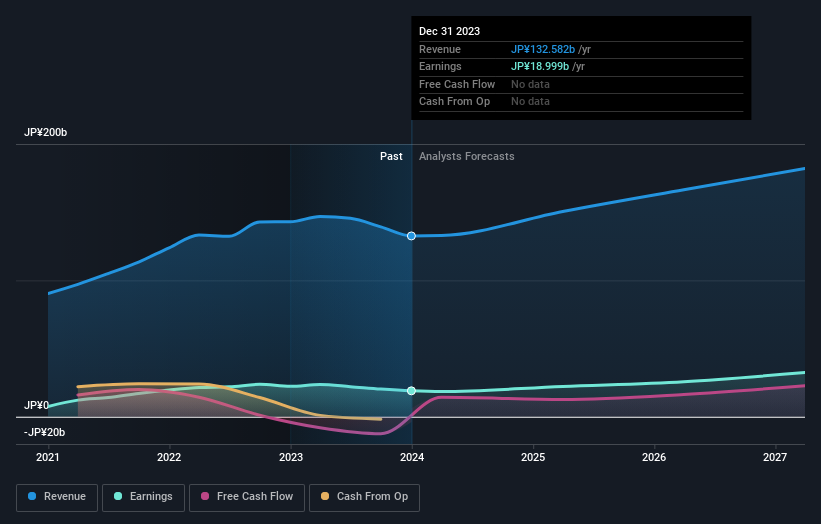Stock Analysis
- Japan
- /
- Semiconductors
- /
- TSE:7729
Institutional investors are Tokyo Seimitsu Co., Ltd.'s (TSE:7729) biggest bettors and were rewarded after last week's JP¥14b market cap gain

Key Insights
- Significantly high institutional ownership implies Tokyo Seimitsu's stock price is sensitive to their trading actions
- 50% of the business is held by the top 18 shareholders
- Ownership research along with analyst forecasts data help provide a good understanding of opportunities in a stock
If you want to know who really controls Tokyo Seimitsu Co., Ltd. (TSE:7729), then you'll have to look at the makeup of its share registry. We can see that institutions own the lion's share in the company with 56% ownership. That is, the group stands to benefit the most if the stock rises (or lose the most if there is a downturn).
And as as result, institutional investors reaped the most rewards after the company's stock price gained 3.4% last week. The gains from last week would have further boosted the one-year return to shareholders which currently stand at 111%.
Let's take a closer look to see what the different types of shareholders can tell us about Tokyo Seimitsu.
View our latest analysis for Tokyo Seimitsu

What Does The Institutional Ownership Tell Us About Tokyo Seimitsu?
Many institutions measure their performance against an index that approximates the local market. So they usually pay more attention to companies that are included in major indices.
We can see that Tokyo Seimitsu does have institutional investors; and they hold a good portion of the company's stock. This can indicate that the company has a certain degree of credibility in the investment community. However, it is best to be wary of relying on the supposed validation that comes with institutional investors. They too, get it wrong sometimes. If multiple institutions change their view on a stock at the same time, you could see the share price drop fast. It's therefore worth looking at Tokyo Seimitsu's earnings history below. Of course, the future is what really matters.

Since institutional investors own more than half the issued stock, the board will likely have to pay attention to their preferences. Tokyo Seimitsu is not owned by hedge funds. Nomura Asset Management Co., Ltd. is currently the company's largest shareholder with 8.0% of shares outstanding. With 7.3% and 5.2% of the shares outstanding respectively, Asset Management One Co., Ltd. and Capital Research and Management Company are the second and third largest shareholders.
After doing some more digging, we found that the top 18 have the combined ownership of 50% in the company, suggesting that no single shareholder has significant control over the company.
Researching institutional ownership is a good way to gauge and filter a stock's expected performance. The same can be achieved by studying analyst sentiments. There are plenty of analysts covering the stock, so it might be worth seeing what they are forecasting, too.
Insider Ownership Of Tokyo Seimitsu
The definition of an insider can differ slightly between different countries, but members of the board of directors always count. Company management run the business, but the CEO will answer to the board, even if he or she is a member of it.
Insider ownership is positive when it signals leadership are thinking like the true owners of the company. However, high insider ownership can also give immense power to a small group within the company. This can be negative in some circumstances.
We can see that insiders own shares in Tokyo Seimitsu Co., Ltd.. The insiders have a meaningful stake worth JP¥6.8b. Most would see this as a real positive. It is good to see this level of investment by insiders. You can check here to see if those insiders have been buying recently.
General Public Ownership
The general public, who are usually individual investors, hold a 42% stake in Tokyo Seimitsu. While this size of ownership may not be enough to sway a policy decision in their favour, they can still make a collective impact on company policies.
Next Steps:
While it is well worth considering the different groups that own a company, there are other factors that are even more important. Consider risks, for instance. Every company has them, and we've spotted 2 warning signs for Tokyo Seimitsu you should know about.
If you are like me, you may want to think about whether this company will grow or shrink. Luckily, you can check this free report showing analyst forecasts for its future.
NB: Figures in this article are calculated using data from the last twelve months, which refer to the 12-month period ending on the last date of the month the financial statement is dated. This may not be consistent with full year annual report figures.
Valuation is complex, but we're helping make it simple.
Find out whether Tokyo Seimitsu is potentially over or undervalued by checking out our comprehensive analysis, which includes fair value estimates, risks and warnings, dividends, insider transactions and financial health.
View the Free AnalysisHave feedback on this article? Concerned about the content? Get in touch with us directly. Alternatively, email editorial-team (at) simplywallst.com.
This article by Simply Wall St is general in nature. We provide commentary based on historical data and analyst forecasts only using an unbiased methodology and our articles are not intended to be financial advice. It does not constitute a recommendation to buy or sell any stock, and does not take account of your objectives, or your financial situation. We aim to bring you long-term focused analysis driven by fundamental data. Note that our analysis may not factor in the latest price-sensitive company announcements or qualitative material. Simply Wall St has no position in any stocks mentioned.
About TSE:7729
Tokyo Seimitsu
Manufactures and sells semiconductor production equipment (SPE) and measuring instruments in Japan.
Adequate balance sheet with moderate growth potential.

